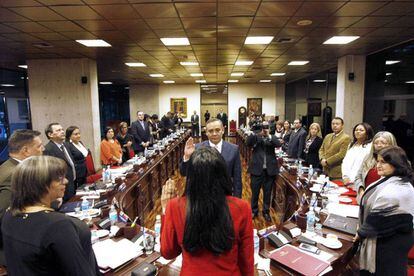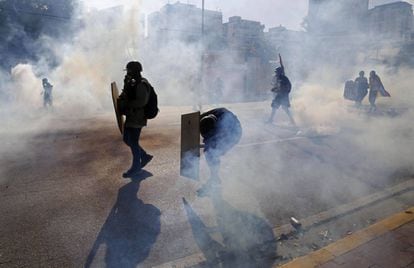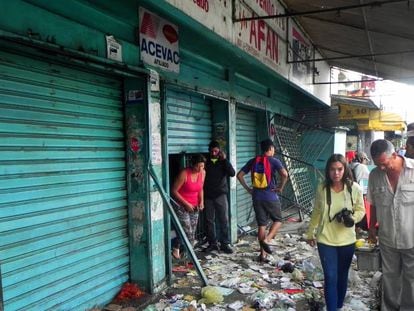US imposes sanctions against eight top officials at Venezuela’s Supreme Court
Treasury freezes assets of chief magistrate and seven judges for “usurping” powers from legislature
The Donald Trump administration is raising the tone against the decline of democracy in Venezuela. On Thursday, the US Treasury Department imposed sanctions against the Venezuelan Supreme Court’s chief magistrate and seven other judges who sit on that tribunal’s Constitutional Chamber, for issuing rulings in the past year that “have usurped the authority of Venezuela’s democratically elected legislature, the National Assembly,” according to a statement released by the Treasury’s Office of Foreign Assets Control.

The statement indicates that the court has allowed “the Executive Branch to rule through emergency decree, thereby restricting the rights and thwarting the will of the Venezuelan people.”
The National Assembly has been under the opposition’s control since January 2016, and President Nicolás Maduro has been accused of using the courts to gradually reduce the powers of the legislative branch while increasing his own.
The sanctions against the eight jurists mean that their assets within US jurisdiction are frozen, and that US citizens are barred from engaging in transactions with them.
The Venezuelan people are suffering from a collapsing economy brought about by their government’s mismanagement
US Treasury Secretary Steve Mnuchin
The asset freeze is the latest move in an increasingly critical US stance against Venezuela, where at least 44 people have died in street protests over the last six weeks, after Maduro announced plans to bypass the National Assembly and draft a new Constitution, thereby adding to the popular unrest caused by food and medicine shortages.
Shortly before the sanctions were announced, Trump had talked about “the deteriorating situation in Venezuela” at a joint press conference with Colombian President Juan Manuel Santos. “It is really in a very bad state,” he said. “America stands with all of the people in our great hemisphere yearning to be free. We will be working with Colombia and other countries on the Venezuelan problem.”
A US government employee told Reuters that Washington is planning new future measures against “bad actors” in Venezuela.

The asset freeze represents the second round of US sanctions against top leaders of the South American nation. In February, the Treasury included Venezuela’s vice-president, Tareck El Aissami, on its blacklist for his “significant role in international drug trafficking.” This made him the highest-ranking Venezuelan official to face sanctions from Washington.
February was also when Maikel José Moreno Pérez became the chief magistrate of the Supreme Court, a body that has become increasingly politicized in recent months. Moreno is a controversial public figure. Shortly before taking up his current position, he ratified the nearly 14-year prison sentence against the opposition leader Leopoldo López for participating in protests against Maduro in 2014. And in 1987, he was accused of murdering a woman in southern Venezuela.
The US Treasury justified its decision to impose sanctions by recalling some of the Supreme Court’s most recent rulings. It mentioned the January 2017 decision that Maduro should give his annual address inside the court, rather than in the National Assembly, as the Constitution establishes. It also noted that in December 2016, the court’s Constitutional Chamber “appointed members of the National Electoral Council, a constitutional duty of the National Assembly.”
The Supreme Court has allowed the Executive Branch to rule through emergency decree, thereby restricting the rights and thwarting the will of the Venezuelan people
US Treasury Office of Assets Control
“The Venezuelan people are suffering from a collapsing economy brought about by their government’s mismanagement and corruption,” the Treasury secretary, Steve Mnuchin, said in a statement. “Members of the country’s Supreme Court of Justice have exacerbated the situation by consistently interfering with the legislative branch’s authority.”
In early April, the Maduro administration authorized the Supreme Court to review the country’s criminal, civil and military laws. It also allowed it to take on parliament’s powers “for as long as there is a persisting situation of contempt and invalid actions by the National Assembly.” But faced with pressure in the streets and from the international community, Maduro backtracked partially just a few days later.
English version by Susana Urra.












































